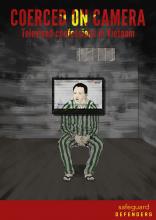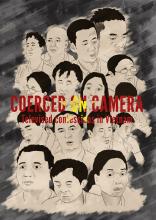Coerced on Camera: how Vietnam forces detainees to confess on TV
An environmental campaigner speaks woodenly on screen as she explains how she plotted to overthrow the state; a man breaks down in frightened tears while his fellow villagers – their faces covered in cuts and bruises -- accuse others of planning violent acts; and an American student promises to never again take part in anti-Vietnam activities.
 These are just some of the many forced televised confessions of detainees – before trial and with no access to legal counsel -- that Vietnam has aired in the past few years on television and online and that are examined in a ground-breaking new report, Coerced on Camera: Vietnam’s Televised Forced Confessions by Safeguard Defenders, out today. Download the full report (PDF) here or click on cover image. Read the press release on the report here:
These are just some of the many forced televised confessions of detainees – before trial and with no access to legal counsel -- that Vietnam has aired in the past few years on television and online and that are examined in a ground-breaking new report, Coerced on Camera: Vietnam’s Televised Forced Confessions by Safeguard Defenders, out today. Download the full report (PDF) here or click on cover image. Read the press release on the report here:
PHIÊN BẢN TIẾNG VIỆT, NHẤN VÀO ĐÂY.
We found footage of at least 21 individuals since 2007 who had been forced to confess on film. That number is likely much much higher. Vietnam's poor human rights record makes it more than likely that many of these victims are also routinely exposed to arbitrary detention, mental and physical torture and threats.
Subjects in our study included rights lawyers, citizen journalists, veteran activists to villagers protesting against land grabs. By analyzing these and interviewing several victims we found that:
- Victims end up on camera through deception, coercion and lies
- The confession content is manipulated or scripted by the police
- Confessors are made to apologise, please for mercy, warn others against copying their “mistakes”, and thank the state for educating and showing them the error of their ways.
Vietnam’s status as a signatory to the International Covenant on Political & Civil Rights and UN Convention Against Torture make it unlawful to produce and air forced confessions by detainees. We also scoured Vietnam's criminal code, criminal procedure code and press law and found that its own laws prohibit the making and airing of forced confessions.
 This report follows our indepth study of China’s practice of airing forced confessions of pre-trial detainees, Scripted and Staged: Behind the Scenes of China’s Forced Televised Confession in 2018.
This report follows our indepth study of China’s practice of airing forced confessions of pre-trial detainees, Scripted and Staged: Behind the Scenes of China’s Forced Televised Confession in 2018.
Like China, some of Vietnam’s victims are made to frame their crimes as being anti-state or anti-Party, a reflection of how authoritarian countries criminalise dissenting or critical voices.
Later confessions from Vietnam also appear to suggest that maybe Hanoi is learning some of China’s techniques. In 2017, a Vietnamese former state-owned company boss was kidnapped from Germany; he later appeared on camera in Vietnam saying he had returned of his own volition. Eerily similar to the broadcast of Swedish publisher Gui Minhai who was kidnapped from Thailand in 2015 and appeared on Chinese TV a few months later to say he had returned to China voluntarily.
Coerced on Camera provides a snapshot of Vietnam’s abhorrent practice of forced confessions. We are using the report’s results to raise awareness of this rights-abusing practice and to call on the Vietnamese government to live up to its responsibilities as a signatory to international rights mechanisms, to comply with its own domestic laws prohibiting forced confessions and to immediately stop airing forced confessions of detainees on television.